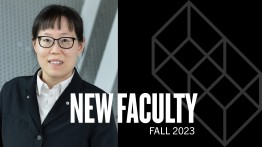Meet Hejintao Huang, Assistant Professor, Civil Engineering
POSTED ON: August 21, 2023

This fall, we are excited to welcome several new full-time faculty members to The Cooper Union’s academic programs. As part of a series introducing this new faculty cohort to our wider community, we spoke to Hejintao Huang who joins the Albert Nerken School of Engineering as assistant professor in civil engineering. She recently completed her Ph.D. in geosystems engineering at the Georgia Institute of Technology where she has recurringly served as an active instructor of record and teaching assistant for Introduction to Geotechnical Engineering.
Tell us about your research interests.
The overarching theme of my research is to generate new fundamental knowledge and gain personal expertise in developing sustainable beneficial use options for waste materials with the goal of improving the safety, resiliency, and sustainability of geo-environmental and geotechnical projects and infrastructure.
At The Cooper Union, I am passionate about expanding my previous work and expertise to a broad range of waste materials, such as industrial wastes, agricultural and animal wastes, extraction and mining wastes, water treatment sludge, and wastewater, and developing comprehensive waste inventories at all levels to identify prospects of beneficial use or inputs of wastes in other industrial processes. I am also enthusiastic about opportunities to design sustainable infrastructure with the goal of capturing and repurposing wastes under the circular economy.
What brought you to The Cooper Union?
The Cooper Union's commitment to preparing engineering students to address political, societal, and environmental challenges aligns well with the core principles guiding my research and teaching philosophies. I firmly believe that as engineers, we play a crucial role in understanding and mitigating the grand challenges that our world faces today, thereby making a significant contribution to society. The Cooper Union's dedication to social justice and ethical responsibility within the field of engineering resonates deeply with my personal mission to educate engineers who are not only technically competent, but also ethically aware and prepared to serve the public good. I am also drawn by the prospect of collaborating with esteemed colleagues within this vibrant intellectual community and the chance to engage with bright, motivated students who are passionate about making a difference.
What aspects of teaching are you most excited about in the coming academic year at Cooper?
In the upcoming academic year, I am thrilled about multiple aspects of my teaching journey. Firstly, I am excited to share my passion for geotechnical engineering with my students. My teaching pedagogy is built upon fostering curiosity, promoting hands-on learning, providing real-world experience, and emphasizing communication skills. I also look forward to mentoring and advising students on their academic and career paths and integrating my research interests into the curriculum to prepare the next generation of thinkers and innovators. I'm excited by the potential of working with students on the ASCE Sustainable Solutions and GeoChallenge competitions, allowing them to apply solid fundamental knowledge to develop reliable, practical, innovative solutions to make a real impact and serve the best interests of people and the planet.




